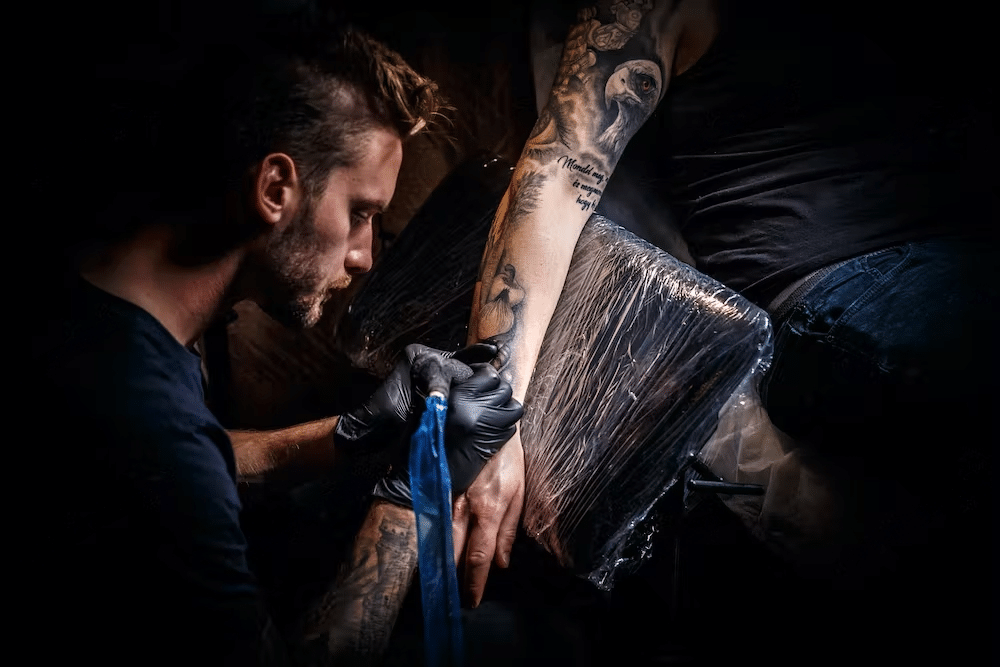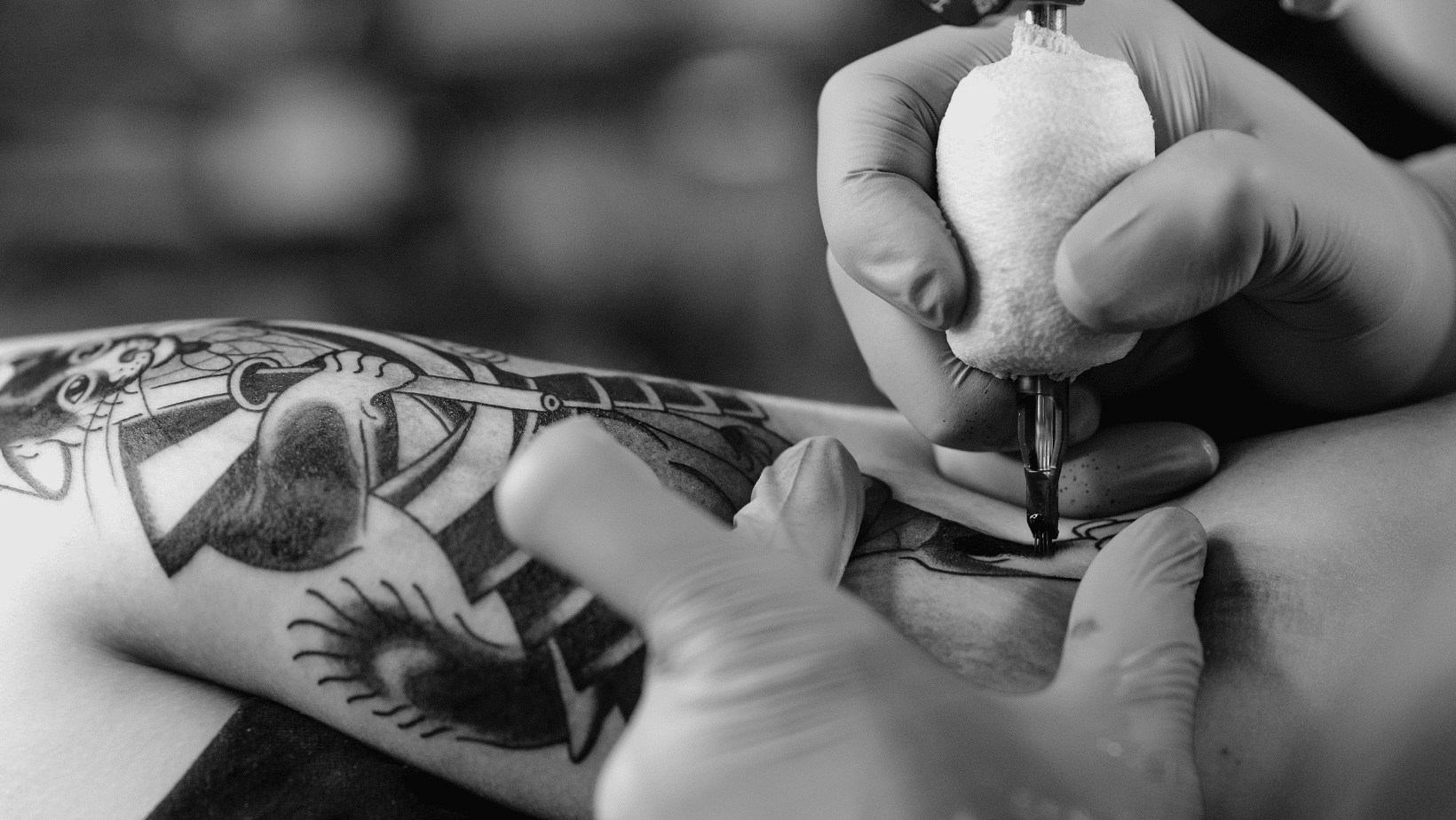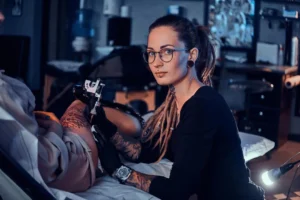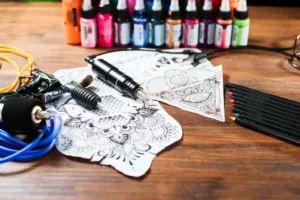
You could be thinking, “Hey, I should be a tattoo artist,” if you’re an artist of some kind or have a few tattoos of your own that you adore. That might be the move for you, but you’ll need more than just an incredibly steady hand. We’re talking about unwavering commitment to your craft, years of arduous labour (some without money), and keen mental focus.While it’s true that you don’t need a degree to tattoo a client, learning from experienced tattoo artists, frequently through an
apprenticeship, is an essential part of the process. Errors are common in the industry, and yes, they’re permanent. We’ll provide you with all the advice you need on becoming a tattoo artist in this blog.
1. Many Tattoo Artists Were Formerly Art Students
Many tattoo artists are familiar with the process of
sketching, painting and drawing. Although tattooing is a skill that takes years to master, many artists start out as trained artists with a knowledge of colour theory, drawing, painting and sketching before they decide to specialise their skills in tattoo artistry.
2. Being Good At Drawing Doesn’t Automatically Mean You’ll Be Good At Tattooing
You can compare it to the distinction between carving a pumpkin and sketching something on paper. Having a natural talent for sketching is undoubtedly advantageous, but it takes a lot of practice to distinguish between what you can tattoo and what you can draw. Your tattoo drawings will
get better with practice, just like anything else, so it’s important to start with easy concepts.
3. Going To School Is Not A Must To Become A Tattoo Artist
The tattoo industry is growing at a rapid pace. The demand for more skilled tattoo artists is on the rise. However, many believe that going to school is not a must to become a tattoo artist.While you might be able to learn all the skills necessary through apprenticeships, it can be hard to find one that fits your schedule and budget. That’s why some people have turned to online courses or self-study instead of enrolling in traditional schools.
4. Prepare For A Huge Up-Front Investment In Equipment.
We advise purchasing a minimum of two tattoo machines, a beginner ink set, tubes (which house the tattoo machine’s needles), as well as some disposable materials like needles, gloves, rubber bands, Thermofax paper, and skin pens. The total cost of the necessary equipment
to get started can be above $4,000. In states that regulate tattoo schools, apprenticeships cost about $10,000 in addition to state licensing fees.
5. There’s No Guarantee That You’ll Ever Make A Ton Of Money.
Even when you start to earn money from your tattoos,
the pay isn’t very generous, and you’ll still need to cover the cost of the supplies on your own. Ultimately, you shouldn’t pursue a career as a tattoo artist for financial gain. Of course, the pay for different artists varies.
6. You’ll Want To Plan Every Design As Much As You Can As Tattoo Artist

The best tattoo artists are those who have a great understanding of the human body and its intricacies, which is why it is important to plan out your design as much as possible. You won’t want to be caught off guard if you get a request for a new design that requires more time and effort than you anticipated.
7. Your Artistic Medium Is A Living, Breathing Thing That Changes
Remember that skin expands, wrinkles, and occasionally develops scars from sunburns. Painting on canvas allows you to keep the appearance of your work for many centuries. Nevertheless, even two weeks after the ink has set in and your skin has healed, tattoos look significantly different.It feels a little like when someone buys your painting and leaves it in the rain. Sometimes people don’t take care of their tattoos, and they become ruined. Even if you’re clear about the aftercare instructions—for example, to avoid the sun for three weeks and only use hypoallergenic products—things might still go wrong from time to time when working with human flesh.
8. It’s Absolutely Possible To Tattoo On All Skin Tones—It Just Takes Skill
It is not easy to tattoo on all skin tones, but it is possible. There are two factors every tattoo artist must keep in mind;
Skin Tone
Skin tone is the colour of your skin, and it can vary from light to dark. For example, if you have a light complexion and want to get a tattoo on your chest, then the tattoo artist will need to make sure that the colours are
bright enough for you.
Tattoo Ink
Tattoo ink is made up of pigments and dyes mixed with water or oil. The pigment in this ink will determine how well it will show up on different skin tones. If you have a darker complexion and want to get a tattoo on your forearm, the colours might not be as vibrant as if you had gotten one in your chest area.
Live Out Your Dream
Permanent body art has been used as amulets, status symbols, professions of love, emblems of religion, adornments, and even as punishment. They can be simple, complex, or everything in between.As different tattoo designs, colours, and styles may be requested by your customers, working as a tattoo artist allows you to hone your creative abilities.
FAQ
What degree is best for tattooing?
Most tattoo artists, 27% to be exact, major in
graphic design. Some other common majors for a tattoo artist include fine arts and business majors.
Can I be a tattoo artist without tattoos?
As it turns out,
tattooless tattooers do in fact, exist and if you’re an Ink Master fan, you’re probably familiar with at least one of them. Back in season two, a contestant named Jamie Davies sparked debate among both fellow artists and the judges for being a tattoo virgin.
What is the easiest tattoo style to learn?
Blackwork tattoos are one of the easiest tattoo styles to recognise due to their intense boldness and sole use of black ink. These tattoos rely on the skin to create depth and contrast within a composition rather than shading.
 You could be thinking, “Hey, I should be a tattoo artist,” if you’re an artist of some kind or have a few tattoos of your own that you adore. That might be the move for you, but you’ll need more than just an incredibly steady hand. We’re talking about unwavering commitment to your craft, years of arduous labour (some without money), and keen mental focus.While it’s true that you don’t need a degree to tattoo a client, learning from experienced tattoo artists, frequently through an apprenticeship, is an essential part of the process. Errors are common in the industry, and yes, they’re permanent. We’ll provide you with all the advice you need on becoming a tattoo artist in this blog.
You could be thinking, “Hey, I should be a tattoo artist,” if you’re an artist of some kind or have a few tattoos of your own that you adore. That might be the move for you, but you’ll need more than just an incredibly steady hand. We’re talking about unwavering commitment to your craft, years of arduous labour (some without money), and keen mental focus.While it’s true that you don’t need a degree to tattoo a client, learning from experienced tattoo artists, frequently through an apprenticeship, is an essential part of the process. Errors are common in the industry, and yes, they’re permanent. We’ll provide you with all the advice you need on becoming a tattoo artist in this blog. The best tattoo artists are those who have a great understanding of the human body and its intricacies, which is why it is important to plan out your design as much as possible. You won’t want to be caught off guard if you get a request for a new design that requires more time and effort than you anticipated.
The best tattoo artists are those who have a great understanding of the human body and its intricacies, which is why it is important to plan out your design as much as possible. You won’t want to be caught off guard if you get a request for a new design that requires more time and effort than you anticipated.



